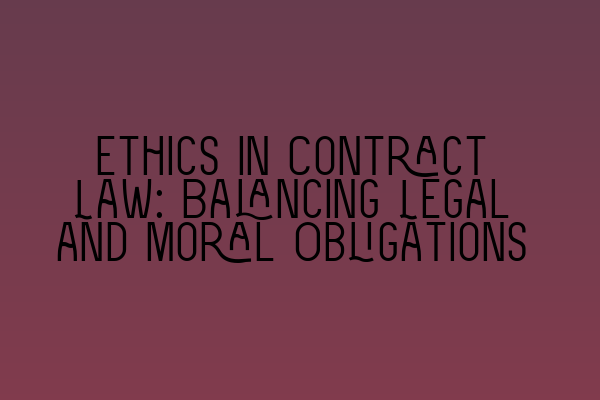Ethics in Contract Law: Balancing Legal and Moral Obligations
In the realm of contract law, the interplay between legal and moral obligations is a topic of great significance. As solicitors, it is our responsibility to navigate this delicate balance and ensure that our clients’ interests are protected while upholding ethical principles. In this article, we will explore the challenges inherent in reconciling legal and moral obligations and discuss strategies for maintaining ethical integrity in contract law.
The Foundation of Contract Law
Before delving into the ethical considerations, it is essential to understand the foundation of contract law. Contracts are legally binding agreements made between two or more parties, establishing rights and obligations. These agreements form the backbone of commerce and provide a framework for business relationships.
While the law provides a set of rules and guidelines for contractual obligations, it does not account for every ethical concern that may arise. This is where the role of the solicitor becomes critical in ensuring that the contract aligns with not only the law but also with ethical standards.
Identifying Ethical Dilemmas
One of the primary challenges faced by solicitors is identifying ethical dilemmas within contract law. Often, it is not a straightforward decision, and the lines between right and wrong may be blurred. For instance, a contract may be legally valid but morally questionable. In such cases, solicitors must carefully consider the potential consequences for all parties involved and assess whether the contract meets ethical standards.
The following are some common ethical dilemmas that solicitors may encounter in contract law:
- Imbalance of Power: In certain contractual relationships, there may be a significant power imbalance between the parties. Solicitors must consider whether the terms of the contract exploit the weaker party and assess whether any adjustments need to be made to ensure fairness.
- Fraud or Misrepresentation: Sometimes, one party may provide false or misleading information during contract negotiations. As solicitors, we have a duty to uncover any fraudulent or misleading statements and advise our clients accordingly.
- Unconscionable Contracts: An unconscionable contract, one that is oppressive or unfair to one party, is considered unethical. Solicitors must scrutinize the terms of the contract to determine if it falls within the boundaries of fairness and conscionability.
- Public Interest: Contracts may also have broader implications for the public interest. In such cases, solicitors must examine whether the contract aligns with public policies and values.
These ethical dilemmas require solicitors to balance their legal obligations with their moral compass. While navigating this delicate balance can be challenging, it is crucial for solicitors to approach contract law with an unwavering commitment to ethical principles.
Strategies for Maintaining Ethical Integrity
As solicitors, it is our duty to uphold the highest ethical standards while representing our clients’ interests. The following strategies can help in maintaining ethical integrity in contract law:
- Thoroughly evaluate the contract: Before advising clients on the validity of a contract, solicitors should undertake a comprehensive analysis of its terms. This evaluation should encompass not only the legal aspects but also the ethical implications of the contract.
- Stay informed of legal and ethical developments: Contract laws and ethical standards are not immutable. It is important for solicitors to stay abreast of any legal or ethical developments that may impact contract law. This knowledge equips solicitors with the tools necessary to navigate ethically complex situations.
- Consult with colleagues or ethics committees: When facing particularly challenging ethical dilemmas, solicitors may seek advice from colleagues or ethics committees. Discussing the issue with others can provide valuable insights and help in making an informed ethical decision.
- Focus on transparency and informed consent: Solicitors must prioritize transparency and informed consent in contract negotiations. Ensuring that all parties understand the terms and implications of the contract can help mitigate potential ethical issues.
- Consider alternative dispute resolution methods: In certain cases, resolving disputes through alternative means, such as mediation or arbitration, may be more ethical than lengthy and costly litigation. Solicitors should explore these avenues as viable options for their clients.
By implementing these strategies, solicitors can navigate the complex terrain of contract law while maintaining their ethical integrity.
Conclusion
Ethics in contract law is a multifaceted issue that requires solicitors to carefully balance legal and moral obligations. By identifying ethical dilemmas, seeking advice when needed, and adopting ethical strategies, solicitors can ensure that their actions align with legal requirements and ethical standards.
To learn more about legal practice and decision-making, read our related article Unveiling Real-Life Case Studies: Insights into Legal Practice and Decision-Making.
For solicitors interested in exploring average earnings and factors affecting income, check out our article on Exploring Solicitor Salaries in the UK: Average Earnings and Factors Affecting Income.
To enhance trust and loyalty in client relationships, solicitors can benefit from reading our article on Mastering Client Relationship Management: Skills for Solicitors to Enhance Trust and Loyalty.
For those considering a law school education in the UK, our article on Pursuing a Law School Education in the UK: Choosing the Right Path for Your Future provides valuable insights and guidance.
Lastly, if you’re interested in learning more about securing training contracts on your journey to becoming a solicitor, our article on Securing Training Contracts: A Roadmap to Becoming a Solicitor offers a comprehensive roadmap.
